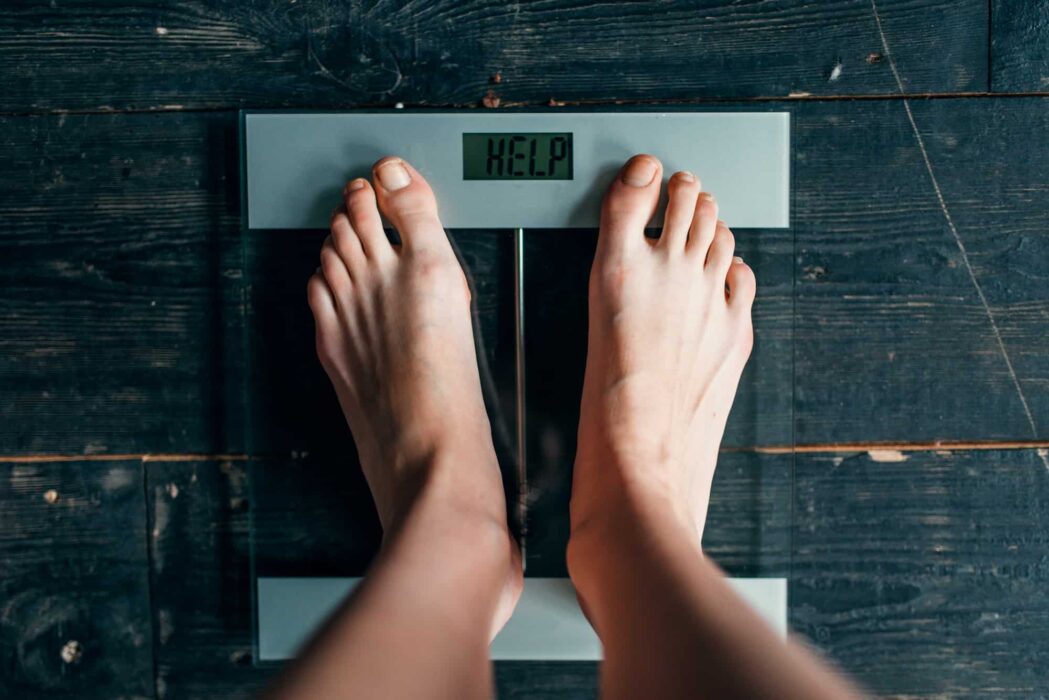An emotional state can affect your overall health as stressful situations and strict diets lead to malfunctions in the work of different organs and systems. Anxiety is a response to physical stress, monotonous schedule, psychological pressure, everyday problems, etc. Can stress cause weight loss?
Yes, stress can increase anxiety and lead to loss of appetite and weight loss. It is not a very healthy process that negatively affects your health. Stress changes your eating behavior in hormones, metabolism, and every system in your body. However, this can be prevented and stopped with a few simple rules.

Why does stress make you lose weight? Why is it dangerous for your health? How to prevent weight loss and healthily reduce stress? Reducing stress and gaining a healthy weight does not take a lot of effort. You just need to follow some simple recommendations, and you will notice that soon your health will improve. In this article, I’ll tell you everything you want to know about stress weight loss. Keep reading to find out more!
Signs of Stress Weight Loss
In the fast pace of the modern world, we cannot always identify increased stress levels and their effect on our bodies. However, if you are experiencing anxiety and fatigue, you should monitor your weight and watch for other symptoms. You should take into account your condition if you observe one of these symptoms at the same time as losing weight.
Latent Stress Symptoms
- Sudden loss of appetite that lasts more than two days. If you have a normal appetite, you should pay attention to its decrease or refusal of the usual food.
- Sleep problems. When you experience latent stress, you can recognize it by insomnia at night and sleepiness during the day. Your brain may be overexcited at night as a result of hormone imbalances during stress.
- Decreased libido. If you are both healthy and have a regular sex life, then a decrease in libido can also be a sign of hidden stress leading to weight loss. If you feel too tired and don’t want to be intimate with your partner for no apparent reason, analyze the possible causes of stress.
- Mood changes for no reason. One of the most obvious signs of stress is mood swings, from joy to anger, irritation for no reason, and apathy.
- Lack of motivation and severe fatigue. If at the end of the day, you have no desire to do something, even joyful things, this is one of the signs of hidden stress. Of course, we all get tired after a hard day, but the regular lack of motivation is something you should pay attention to.
- Various pain signals throughout the body. If you have an unreasonable headache, muscle tension, stomach pain (nausea, constipation, or diarrhea), or joint pain, this could mean that you are under severe stress.
- Absent-mindedness and memory problems. You may forget what you were going to do or lose small things, skip appointments and be absent-minded. This means your brain is trying to cope with stress.

Reasons for Stress Weight Loss
The fact is that the body perceives the long-term nervous experience as a period of illness. As a result, more often than not, people can experience a complete loss of appetite. And when you cannot eat because you are in great excitement or stress, you lose weight fast. But this is perhaps the most obvious reason. In fact, everything is a little more complicated.
The likelihood of losing weight under stress is higher than gaining weight. It is because a significant amount of cortisol, adrenaline, and norepinephrine are released into the bloodstream. These are the hormones responsible for our emotions and the functioning of the nervous system, brain, and metabolism.
So, adrenaline is responsible for the production of fatty acids and tissue metabolism. It can enhance the breakdown of fats into simple components. Blood pressure can change under the influence of norepinephrine, and the same hormone activates the work of all internal organs.
Cortisol, in turn, controls carbohydrate metabolism, which is directly related to the balance of the body’s energy reserves. During stress, the concentration of all these hormones rises sharply. It means that nutrients begin to be consumed in high quantity to make your body ready for any stress. A temporary rush of strength is important and necessary to solve the problem. But if this stressful state is constant, your internal reserves are depleted. As a result, healthy sleep and appetite may disappear, and you begin to lose weight quickly.
Malnutrition negatively affects not only the digestive organs. It can cause loss of strength, drowsiness, menstrual irregularities in women, hair loss, deterioration of the skin and nails, and disorders in the musculoskeletal system.
Why Is It Dangerous?
Increased stress is not always the only reason for dramatic weight loss. Losing weight due to stress is often accompanied by other factors that affect your health. In addition to physiological causes, stress-related weight loss can disorganize your routine, affecting and disrupting your habits. First of all, this is a lack of eating habits and appetite.
Sometimes food refusal can occur as a background of stress, and it may reveal itself in chronic nausea and vomiting. People with stress and anxiety may refuse to eat, leading to eating disorders such as anorexia. This is a psycho-emotional state that requires the help of a psychologist and special therapy. Also, negative factors include all bad habits, such as alcohol and smoking.

Why Is Artificial Stress Dangerous?
Sometimes people who have experienced stress and losing weight in such a situation may consider it a benefit to the body. Some people then try to artificially create a stressful situation for weight loss. However, it is a very dangerous idea. Firstly, this process is very difficult to control – it can lead to severe exhaustion, even critical health disorders.
Secondly, losing weight from stress can result in a sharp increase in adipose tissue after the cause of the stress disappears. The drastic weight loss will, in any case, affect the performance of all primary body systems. In particular, the health of the heart, liver, kidneys, and pancreas can be impaired. Therefore, in no case try to lose weight by entering the body into artificial stress.
Losing weight under stress is by no means a safe phenomenon that can lead to very unpleasant consequences. Of course, for a while, people can rejoice in losing weight, but in fact, they do not even suspect that dangerous processes are taking place in the body. A serious illness such as anorexia begins, in most cases, due to the refusal to eat in a stressful state. In addition, common consequences include:
- Heart arrhythmia.
- Irregular menstrual cycle in women.
- State of drowsiness and apathy.
- Decreased performance of the brain.
- Severe insomnia.
- Muscle spasms.
- Violations in the work of the musculoskeletal system.
- Rapid hair loss.
Chronic stress leads to a complete imbalance in the body. If you do not eat enough food, the stress condition can be further intensified. The worst thing is that people often discover their extremely low weight at a late stage when serious treatment is already required.

How to Reduce Stress and Gain Healthy Weight?
You can cope with stress and turn to normal body weight on your own if there are no other dangerous conditions. To do this, you need to adhere to some simple recommendations.
Get Good Rest and Sleep
Be sure to normalize your night’s sleep. It is a versatile remedy for both stress and stressful changes in weight. Thanks to the night’s rest, the hormone leptin is produced, which is responsible for the feeling of fullness. If you go to bed late, you not only have time to get hungry, but you will also feel a slight feeling of hunger for a long time, even when your stomach is full. Besides, during stress, leptin levels change, which can lead to a complete lack of appetite.
The synthesis of hormones produced by the thyroid gland and the hormone testosterone is also reduced due to lack of sleep. Namely, they are responsible for good metabolism. On the contrary, the amount of the stress hormone cortisol will increase during sleep deprivation, provoking changes in appetite. Therefore, your hormonal system is most healthy when you go to bed well before midnight.
Go to bed early, try to think of something pleasant before bed, and leave a few minutes to stay in bed in the morning. If you can’t get your sleep to work on your own, you should consult a specialist.
Reduce Caffeine Intake
This substance is able to increase cortisol levels, which are already increased during stress and anxiety. Therefore, excessive caffeine consumption can negatively affect your emotional state, sleep, and activity during the day.
In large quantities, caffeine can cause overstimulation of the nervous system, anxiety, tremors, heart palpitations, and increased blood pressure. And that’s not what you need during times of stress, is it? In addition, it is believed that regular consumption of coffee interferes with the absorption of nutrients and flushes out calcium, magnesium, and potassium.
If you feel emotional stress and anxiety, replace coffee with herbal teas to help your nervous system. These are chamomile, linden, mint, and thyme. Such tea will help you to normalize your sleep, calm your anxiety and normalize blood pressure levels.
Eat Well
Your diet should be balanced, especially during times of stress. Avoid skipping meals due to a busy work schedule or lack of appetite. Eat fruits, vegetables, protein, fish, dairy foods, and nuts to ensure your body gets all the nutrients it needs.
Besides, stress can be controlled with the foods you add to your diet. These foods can help you cope with fatigue and restore emotional stability:
- Omega-3 fatty acids help reduce stress hormone levels.
- Vitamin C helps the immune system to function properly and reduces cortisol levels.
- Complex carbohydrates regulate blood pressure and increase serotonin levels.
- Magnesium improves sleep quality, reduces fatigue and headaches.
A balanced diet supports physical and mental health. Make sure you are consuming enough calcium-rich foods such as dairy foods. During stress, calcium is excreted from the body, which can lead to various health problems. Also, during nervous tension, the body loses a large amount of vitamin C and B vitamins. Eat more vegetables, grains, and animal protein. Magnesium, which helps the body cope with the negative effects of stress, is found in nuts, buckwheat, beans, brown rice, and cocoa. Omega-3 fatty acids that increase the body’s resistance to stress and depression are found in fish and various types of healthy oils.

Move More
Walking outdoors is good for your physical health and mood, especially during times of stress and anxiety. During walks and sports, your body produces endorphins, which improve mood and help the body resist stress. No wonder many clinics for the treatment of neuroses include running in the rehabilitation program.
What Is Considered an Active Lifestyle?
For the exercises to give the expected effect, they must be performed regularly for a long time. Regular and correctly selected physical activity is the key to a fit, healthy body and the guarantee of emotional stability and mental balance. You don’t have to choose a tough workout, as exhausting sports can push you towards even greater weight loss. Instead, find an activity that you enjoy – whether it be dancing, jumping jacks, cycling, or rollerblading.
Try Yoga and Meditation
Yoga and meditation can reduce stress hormones, blood pressure and restore strength. Just 5-10 minutes of daily solitude is enough to feel a surge of energy, but you also need to do it regularly. Yoga has many poses for stress relief, and you can enjoy a child’s pose or happy baby pose without any effort.
There are many different meditation techniques. The simplest is:
- Set a timer for 5 minutes.
- Sit in a comfortable position.
- Distract yourself from external thoughts and breathe calmly, focusing on deep breathing.
In order not to be distracted by noises and thoughts, repeat “inhale”/”exhale” to yourself with each inhalation and exhalation.
Change Your Attitude
The best treatment for stress weight loss is to avoid this situation completely. To prevent stress from having such a negative effect on your body, you should try to control your attitude towards the stressful situation:
- If you are unable to change the situation, do not take it personally. Some things are beyond your control, and that’s okay.
- Hope for the best but consider all possible scenarios.
- Find something that gives you harmony. Do it regularly. It can be a walk, some kind of hobby, concerts, or books. The main thing is not to use alcohol and other addictive things as a relief.
- Seek support. Communication with friends, family, and like-minded people can help you cope with any stress. The main thing is that this communication distracts you from unnecessary worries and brings joy.
Conclusion
Stress resistance is the main ability that protects the body from extreme environmental influences. In order to relieve stress and stop losing weight, you must first force yourself to eat healthily. Change coffee for herbal teas, meditate, sleep more, and add exercise, but don’t exhaust yourself. You shouldn’t overdo your medications, especially when taking strong antidepressants that can be addictive.
If you lose appetite due to stress, try eating something that increases your appetite. These foods include a variety of spices, fruits, and sweets. Chocolate, by the way, is an excellent antidepressant. However, if you feel that you have other severe stress symptoms, are losing weight too quickly, and cannot eat, you should see your doctor urgently.
